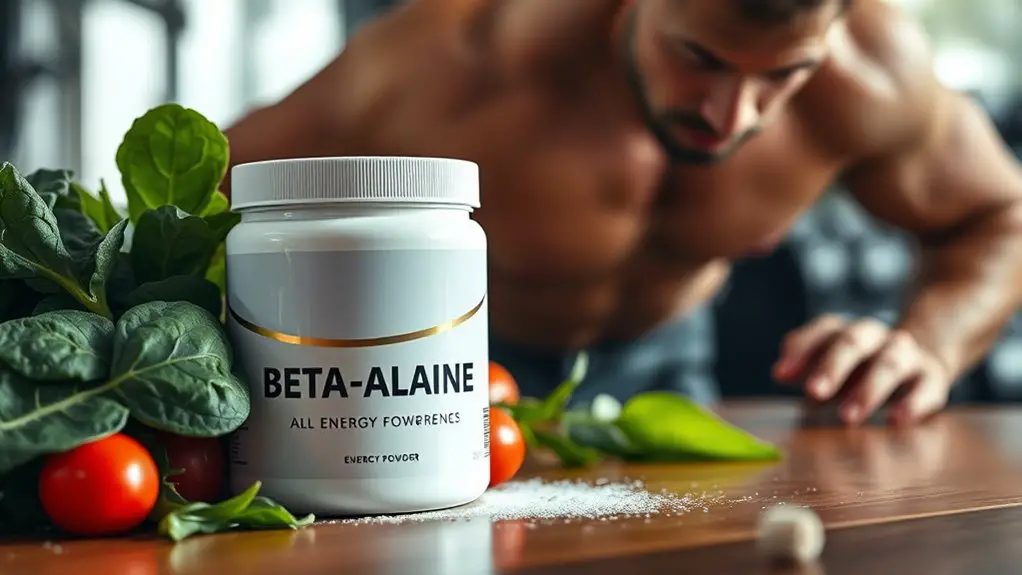The Best Supplements for Strength and Muscle Growth

To boost strength and muscle growth, consider incorporating whey and casein protein powders for peak recovery and muscle repair. Creatine enhances power and performance, while BCAAs support recovery and reduce soreness. Beta-Alanine improves endurance, allowing for longer workouts. Omega-3 fatty acids help reduce inflammation and support joint health. Additionally, make certain you’re getting enough Vitamin D and calcium for proper muscle function. Discover more effective strategies to maximize your gains and enhance your training results.
Understanding the Role of Supplements in Muscle Growth

When it comes to building muscle and increasing strength, understanding the role of supplements can be essential. Proper supplement timing can greatly impact your results. For instance, taking certain nutrients before or after a workout may maximize their effectiveness. Pre-workout supplements can boost energy and performance, while post-workout options help with recovery and muscle repair.
Moreover, nutrient synergy plays a critical role. Combining specific supplements can enhance their individual effects. For example, pairing creatine with carbohydrates can improve muscle uptake, leading to better results. Similarly, taking branched-chain amino acids (BCAAs) alongside protein can support muscle recovery more effectively than taking them alone.
Ultimately, you’ll want to tailor your supplement routine to your own goals and needs. By understanding how supplement timing and nutrient synergy work, you can optimize your muscle-building efforts and enhance your overall strength training regimen.
Protein Powders: The Foundation of Muscle Building
Protein powders serve as a cornerstone in the journey toward muscle building and strength enhancement. Incorporating the right type of protein can greatly influence your progress. Here are three key types to evaluate:
- Whey Protein: This fast-digesting protein is ideal for post-workout recovery. It rapidly delivers amino acids to your muscles, promoting growth and repair.
- Casein Protein: Unlike whey, casein digests slowly, providing a sustained release of amino acids. This makes it perfect for nighttime use, ensuring your muscles have nutrients during sleep.
- Blended Proteins: Combining whey and casein can offer the benefits of both. You get quick recovery from workouts and prolonged muscle support throughout the day.
Creatine: Boosting Strength and Power

Creatine has become a staple for athletes and fitness enthusiasts looking to enhance strength and power. This organic compound, found in creatine sources like red meat and fish, helps replenish adenosine triphosphate (ATP) during high-intensity activities. By increasing your muscle creatine stores, you can improve your performance in short bursts of effort, such as sprinting or weightlifting.
For best results, understanding creatine timing is essential. Taking creatine post-workout can enhance muscle recovery and promote adaptation, while pre-workout supplementation may boost immediate performance. Many athletes choose a loading phase, consuming higher doses initially, followed by a maintenance phase to keep muscle saturation.
Incorporating creatine into your regimen can lead to greater strength gains and muscle growth. However, remember to stay hydrated, as creatine draws water into your muscles, potentially affecting your overall hydration levels.
Branched-Chain Amino Acids (BCAAs): Enhancing Recovery
Branched-chain amino acids (BCAAs) play an essential role in muscle recovery by reducing exercise-induced muscle damage and promoting protein synthesis. To maximize their benefits, understanding the ideal dosage is key for enhancing your recovery process. By incorporating BCAAs into your regimen, you can support your muscles more effectively after intense workouts.
Role in Muscle Recovery
When you’re pushing your limits in the gym, the recovery process becomes essential to your progress, and that’s where branched-chain amino acids (BCAAs) come into play. These essential nutrients are critical for muscle repair and can greatly enhance your recovery nutrition. By incorporating BCAAs into your regimen, you can experience:
- Reduced muscle soreness: BCAAs help decrease the delayed onset muscle soreness (DOMS) after intense workouts.
- Enhanced muscle protein synthesis: They stimulate the process of building new muscle tissue, fundamental for growth and recovery.
- Improved endurance: By minimizing fatigue, BCAAs allow you to train harder and longer, promoting better overall performance.
Incorporating BCAAs into your post-workout routine can expedite your recovery, ensuring you’re ready for your next workout.
Optimal Dosage Recommendations
Finding the right dosage of branched-chain amino acids (BCAAs) is essential for maximizing their benefits in muscle recovery. The general dosage guidelines suggest taking around 5-10 grams before and after workouts. This helps reduce muscle soreness and enhance recovery. For ideal results, consider timing strategies; consuming BCAAs before your workout can provide immediate energy support, while post-workout intake aids in muscle repair. Additionally, if you’re training intensely or frequently, you might increase your intake to 15 grams per day. Remember, it’s always a good idea to consult a healthcare professional before making changes to your supplementation routine. By following these recommendations, you can effectively support your recovery and ultimately improve your strength and muscle growth.
Beta-Alanine: Improving Endurance and Performance

Beta-alanine is a powerful supplement that can enhance your muscle endurance, allowing you to push through longer workouts. By reducing fatigue during intense exercise, it helps you maintain peak performance levels. Incorporating beta-alanine into your regimen may lead to significant improvements in your training results.
Enhanced Muscle Endurance
While many supplements promise enhanced performance, beta-alanine has gained considerable attention for its ability to improve muscle endurance during high-intensity exercise. By increasing muscle carnosine levels, beta-alanine plays an essential role in enhancing muscle oxygenation and buffering lactic acid buildup. This can lead to improved performance in endurance training.
Here are three key benefits of beta-alanine:
- Increased Work Capacity: You’ll be able to perform more reps or run longer distances.
- Delayed Fatigue: Enhanced muscle endurance helps you push through tough workouts.
- Improved Recovery: You’ll recover faster, allowing for more frequent training sessions.
Incorporating beta-alanine into your supplement regime can greatly boost your endurance and overall performance.
Reduced Fatigue During Workouts
As you push through intense workouts, reducing fatigue becomes essential for maintaining performance and achieving your fitness goals. Beta-alanine is a popular supplement known for its ability to enhance endurance and diminish fatigue. By buffering lactic acid in muscles, it allows you to push harder for longer.
To maximize its benefits, consider supplement timing and nutrient synergy with other performance-enhancing supplements.
| Supplement | Timing | Synergy with |
|---|---|---|
| Beta-Alanine | Pre-workout | Creatine, Citrulline |
| Creatine | Post-workout | Beta-Alanine, Protein |
| Citrulline | Pre-workout | Beta-Alanine, BCAAs |
| BCAAs | During workout | Protein, Creatine |
| Protein | Post-workout | Creatine, BCAAs |
Incorporating these strategies can help you combat fatigue effectively.
Optimal Performance Benefits
To enhance your workout performance, incorporating beta-alanine into your routine can greatly improve endurance. This supplement helps buffer lactic acid buildup, allowing you to push through high-intensity sessions longer. For peak results, consider these key strategies:
- Supplement Timing: Take beta-alanine 30-60 minutes before your workout to maximize its effects.
- Consistent Usage: Daily intake of beta-alanine can lead to significant increases in muscle carnosine levels, enhancing performance over time.
- Nutrient Synergy: Combine beta-alanine with other supplements like creatine for improved strength and overall performance.
Omega-3 Fatty Acids: Supporting Overall Health

Omega-3 fatty acids are essential for supporting overall health, particularly for those engaged in strength training and muscle growth. These fats play an important role in reducing inflammation, promoting heart health, and enhancing recovery after workouts. Incorporating omega-3 sources into your diet can considerably impact your performance and well-being.
Here’s a quick overview of omega-3 benefits and sources:
| Omega-3 Benefits | Omega-3 Sources |
|---|---|
| Reduces muscle soreness | Fatty fish (e.g., salmon) |
| Supports joint health | Chia seeds |
| Enhances heart health | Walnuts |
Integrating these sources into your meals can help you reap the benefits of omega-3s. Whether you prefer fish, seeds, or supplements, ensuring adequate intake is essential for ideal strength and muscle growth.
Vitamin D and Calcium: Essential for Muscle Function
While many vitamins and minerals are important for overall health, vitamin D and calcium are particularly essential for muscle function and strength. Vitamin D helps regulate calcium absorption, which is fundamental for effective muscle contraction. Without adequate levels of these nutrients, you may hinder your muscle growth and performance.
Here are three key points to reflect on:
- Muscle Contraction: Calcium is crucial for muscle fibers to contract properly. A deficiency can lead to muscle weakness and cramping.
- Calcium Absorption: Vitamin D enhances the body’s ability to absorb calcium from food, ensuring your muscles receive the support they need.
- Bone Health: Strong bones are fundamental for overall strength, and vitamin D alongside calcium helps maintain bone density.
Incorporating vitamin D and calcium into your diet can greatly improve your strength training results and overall muscle function.
Frequently Asked Questions
Are There Any Side Effects of Taking Muscle Growth Supplements?
When considering muscle growth supplements, it’s vital to be aware of potential side effects. Some may experience digestive issues, increased heart rate, or hormonal imbalances. Safety concerns also arise, particularly with unregulated products. Always research ingredients and consult a healthcare professional before starting any supplement. It’s important to weigh the benefits against the risks, ensuring that your approach to muscle growth is both effective and safe for your overall health.
How Long Does It Take to See Results From Supplements?
On average, you might start seeing results from supplements within 4 to 8 weeks, but individual results can vary greatly. A study found that nearly 70% of participants noticed improvements in strength and muscle mass when combined with proper nutrition and exercise. For ideal results, consider supplement timing; taking them around your workouts can enhance effectiveness. Remember, consistency and a balanced diet are essential for achieving your fitness goals.
Can Supplements Replace Whole Foods in My Diet?
Supplements can’t fully replace whole foods in your diet. While they offer specific supplement benefits, like convenience and targeted nutrients, whole food alternatives provide a broader range of vitamins, minerals, and fiber essential for overall health. Whole foods support better digestion and satiety, which supplements alone can’t achieve. It’s best to use supplements to complement a balanced diet, ensuring you get the necessary nutrients for peak performance and well-being.
What Is the Best Time to Take These Supplements?
When it comes to timing, consider both pre workout and post workout absorption. Taking supplements before your workout can enhance energy and performance, while consuming them afterward aids in recovery and muscle growth. Aim to take protein and creatine before and after your sessions. For best results, align your intake with your training schedule, ensuring your body has the nutrients it needs when it needs them most for maximum benefits.
Are There Age Restrictions for Using Muscle-Building Supplements?
When considering muscle-building supplements, age recommendations are vital. Generally, it’s advised that youth athletes under 18 should avoid them, as their bodies are still developing. Instead, focus on a balanced diet and proper training. If you’re older, consult a healthcare professional before starting any supplement regimen. It’s important to guarantee they’re safe and suitable for your age and health status to maximize benefits while minimizing risks.




